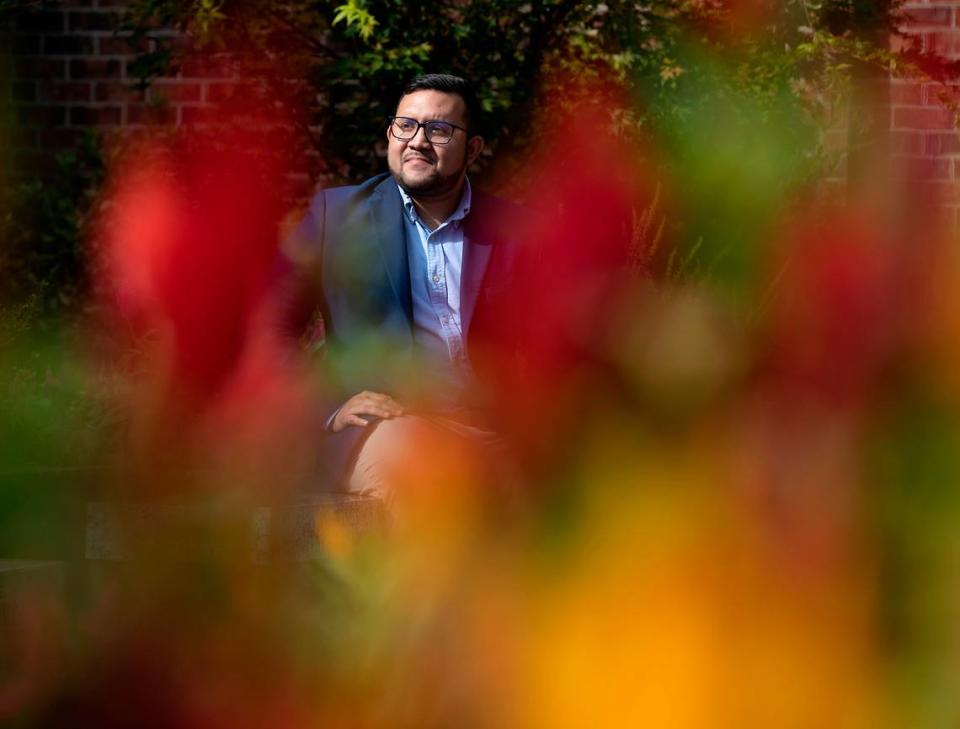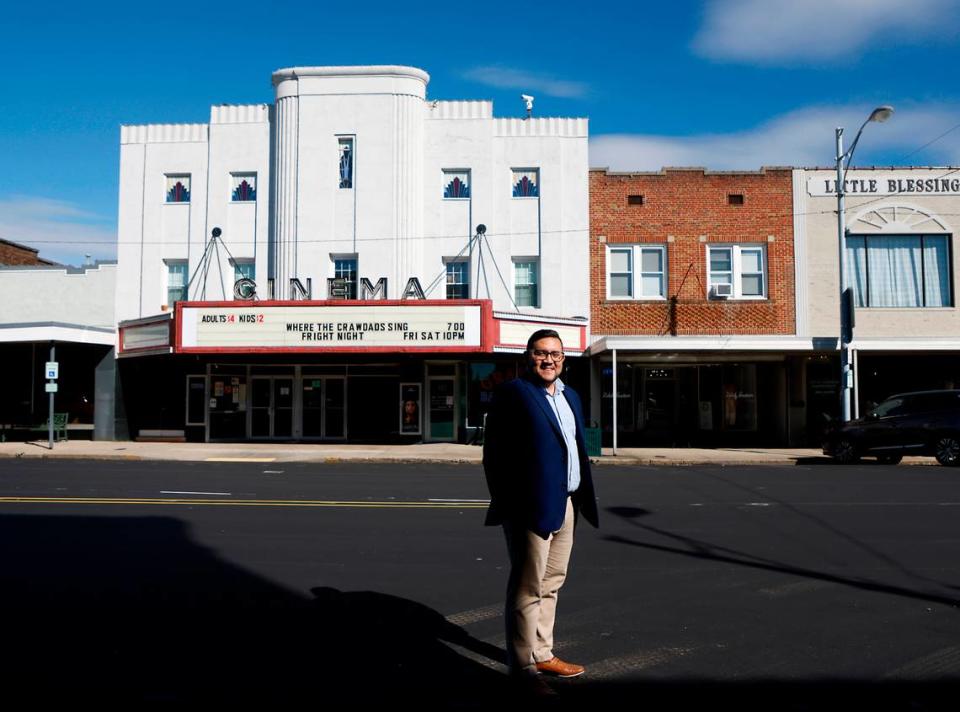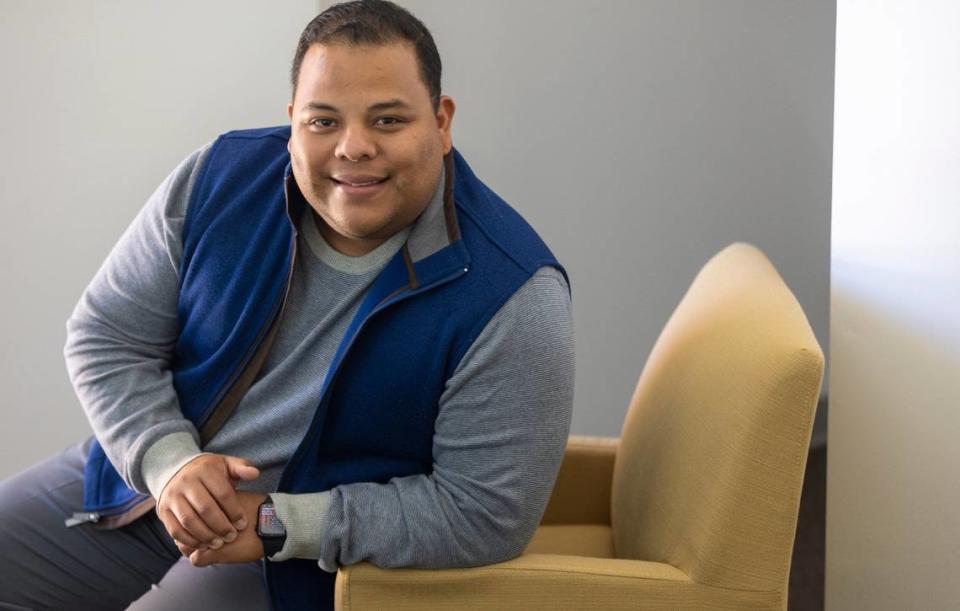Hispanics across NC are underrepresented in this year’s election campaigns. Here’s why.
Across all of North Carolina, there are only 27 Hispanic candidates out of more than 2,000 on the ballot this November.
This means that while 10.7% of the state’s population identifies as Hispanic — according to 2020 census data — just more than 1% of all candidates do.
North Carolina’s Hispanic population boomed in the past decade, which largely entitled the state to a new 14th seat in the U.S. House of Representatives, The News & Observer previously reported.
Despite this, currently just 14 Latinos — and none at the congressional level — hold political office in the state, The News & Observer reported. Even if all Hispanic candidates on the ballot this November were to win their races, the state’s Hispanic population would remain underrepresented.
Where are candidates running?
The bulk of Hispanic candidates are running in county board of education races, a few are vying to serve as county commissioners, two are running to serve as district court judges and seven are running for seats in the N.C. House of Representatives. No Hispanic candidates are running in congressional races, state Senate races or for seats on the state’s appeals court or its Supreme Court.
Of all Hispanic candidates, 10 are running as Republicans, six as Democrats and the remainder are in nonpartisan races. Wake and Mecklenburg each have four Hispanic candidates running, while each of a batch of other counties has one or two, according to The N&O’s analysis.
While the Hispanic population in the state has exploded recently, the group’s political power is diminished by several factors. The reason is not cut and dry.
Hispanic communities are a diverse group, whose origins, histories and beliefs do not fit in one category. Many may not identify with American parties and politicians or align fully with their proposed ideas, giving them less reason to vote — or to run for office.
Studies have found some Hispanic voters are marginalized, which can be geographic but also cultural and linguistic. Many may not be able to access relevant voter information.
Pollsters and experts have often cited low voter registration as a big reason for low Hispanic turnout. Additionally, not all Hispanics over 18 are citizens and therefore eligible to vote.
Hispanics make up 3.5% of all registered voters in the state, and just 36% of all Hispanics in North Carolina over 18 years of age are registered voters, according to an N&O analysis of State Board of Elections voter registration data from Oct. 1 and 2020 census data.
Frederick Velez, the national director of civic engagement at the Hispanic Federation, said he always compared the state’s Hispanic voter registration rates “to other places like Florida, New York, Georgia, Pennsylvania, where you have populations that are more settled and are also more of a Puerto Rican-, or Cuban-leaning population.”
In North Carolina, Velez said, many people initially arrived in the 1970s and ‘80s from Mexico to work for growers and have not been politically active.
Hispanic Federation is a nonprofit that advocates for Hispanics across the nation.
“So the crazy thing about North Carolina is that it’s going to keep growing in importance because of the growing population,” Velez said. “In addition, North Carolina has a very young Hispanic population… which is now coming of age and getting politically involved.”
Still, Hispanic Federation says there is work to be done to get young, second-generation Hispanic voters to the ballot. Many, he said, have had their parents and family be “persecuted by the American government, and their policies in some cases, so you have also a lot of people that are young, that are jaded, and say, ‘Why would I participate?, it’s not going to help me or my family members.’ “
Hispanic voters also face roadblocks to getting their vote counted, according to Democracy NC’s 2020 Voter Turnout Report: In 2020, Hispanic voters who cast provisional ballots were more likely to have them rejected than white voters.
Provisional ballots are used to allow voters to cast a ballot even if their eligibility to vote is uncertain, such as when a voter’s record of registration cannot be found.
Of the 2,089 provisional ballots cast by Latino voters, 68% did not count, while 57% of the provisional ballots cast by white voters did not count, according to this report.
Hispanics running to serve in the NC House
There are seven Hispanic candidates on the ballot for the N.C. House, the highest-level race in the state with any Hispanic candidates. Four are running as Republicans, two as Democrats and one as a Libertarian.
Currently, there is only one Hispanic member of the General Assembly. When Rep. Ricky Hurtado, a Democrat, was elected in 2020 — after flipping a seat in Alamance County held by Republican Stephen Ross — he became the only Hispanic elected to the legislature that year.

For representation proportional to population, there would have to be 17 or 18 Latino members among the state’s 170 legislators, not just one.
Hurtado is now on the ballot again, running once more against Ross in one of the state’s most competitive House districts. Most recently, Hurtado was in the news for a photo doctored by the Carolina Leadership Coalition, picturing him wearing a T-shirt that says “defund the police.”
The son of immigrants from El Salvador, Hurtado said for him the lack of Hispanic political representation despite the large population means “we have a lot of blind spots as a community, as a state when it comes to the unique challenges and opportunities that come with serving this community.”

Hurtado highlighted that being the only Hispanic legislator in the General Assembly often meant that when Hispanic community members went to the legislature, if at all, they’d be immediately pointed over to his office, regardless of whether they were in his district.
“I think it’s a disservice,” he said. Hurtado also said that Hispanics are “free agents,” who care about the issues and who’s “fighting for them” and not necessarily the party affiliation.
Hispanic voters and the Republican Party
Polls across the nation show Latinos skew left — but not so significantly as to be a guaranteed vote.
And individual Hispanic communities diverge in party preferences. In broad terms, Cubans tend to vote Republican, while Mexicans and Puerto Ricans usually support Democrats. As these communities, grow, shift and establish, party preferences fluctuate.
Hurtado said he’s told both parties that whoever spends “time and energy and resources to support Latino candidates and support Latino community, is probably going to have a better forecast in terms of their political positioning in the future of North Carolina.”
Still, he said, the Hispanic community is weary of Republicans and its “Trumpism politics” that divide and seek to instill fear. Democrats, in turn, he said, are investing in greater opportunities for Hispanics and helping them achieve the American dream.
Two extremely competitive and important seats for Republicans are Hurtado’s and the one sought by Brian Echevarria, according to North Carolina House Republican Caucus Director Stephen Wiley. Those seats are critical to determining whether Republicans win a supermajority in the upcoming elections and are likely to be the House’s most expensive races this year, Wiley said.
Echevarria, a Republican with Cuban and Bahamian heritage, is running to represent state House District 73, which includes Concord and Harrisburg. He’s running against Democrat Diamond Staton-Williams, who is a Black woman and an elected member of the Harrisburg Town Council.
For Republican National Committee spokeswoman Taylor Mazock, the lack of Hispanic candidates on the ballot in North Carolina is explained by the population’s growth being relatively recent.
“I think the Republican Party is gaining with Hispanic voters,” she said. “You first begin with the voters, and then you start having more candidates that want to get out and run for public office. So I think it’s a process that can take a couple of election cycles. And I think we’re in the midst of that process right now,” said Mazock.
“Starting at the at the local level, that growth of Hispanic GOP candidates will come to fruition on the federal side, in North Carolina in the coming election cycle,” she said.
Wiley, responding to N&O questions regarding the Republican Party’s efforts to recruit Hispanic candidates, said “representation matters” and that, “we probably need to make a concentrated effort of recruiting folks who are not white men, and we do want to recruit the most qualified people to run for their district.”
While the Republican Party looked for opportunities to elect Hispanic candidates this election season, Wiley said, a lot happened organically, in particular because House district lines remained in limbo and it was difficult to know who would be eligible to run.
One Hispanic Republican candidate on the ballot this November, Charles Lopez, was recruited by Republicans after they looked through membership lists of associations, and for his previous political activism, Wiley said.

Lopez is running for N.C. House District 50 in Orange County against Democrat Renee Price. He was the former chair of the North Carolina Hispanic Republican Coalition and state chairman for the Republican National Hispanic Assembly.
The district is currently held by Democrat Graig Meyer. It encompasses Yanceyville and Hillsborough and has pockets of Hispanic voters, but they are spread apart. Orange County as a whole leans heavily Democrat.
“I think the writing’s on the wall that it’s never been won by Republicans in this district since post-Reconstruction.” said Lopez.
Lopez moved to North Carolina five years ago, having previously been in Florida. His father, a veteran and carpenter, was Mexican and his mother was Guatemalan and worked as a housekeeper. He is running for office to advocate for small businesses, better education, expanding adoption opportunities and ending abortions, among other things, Lopez said.
He also said that despite the notion that Hispanics lean Democratic, Hispanic values align with Republicans, in particular, in terms of valuing family, religion and the future.
“Why do Hispanics make the journey to the United States? Because of the future,” Lopez said. Republicans value merit-system principles, said Lopez, so “if we teach you how to fish, you can fish for yourself. You can do this in America and you can be great,” he said.
The N&O requested an interview with the North Carolina Democratic Party to discuss Hispanic candidates on the ballot and their strategy to harness Hispanic votes but received a written statement.
“North Carolina Democrats are committed to engaging with Latino voters across North Carolina through dedicated outreach that can meet them where they are – whether that be in their community, at their doors, over the phone, or through online engagement,” wrote North Carolina Democratic Party spokesperson Julia Walker.
“It is also the duty of our party to empower Latino candidates to run for office that will be responsive to the needs of their constituents, including lowering costs, investing in good-paying jobs, and improving access to quality, affordable medical care, and reflective of the diversity of North Carolina,” she wrote.
For more North Carolina government and politics news, subscribe to the Under the Dome politics newsletter from The News & Observer and the NC Insider and follow our weekly Under the Dome podcast at campsite.bio/underthedome or wherever you get your podcasts.

 Yahoo Movies
Yahoo Movies 
